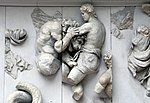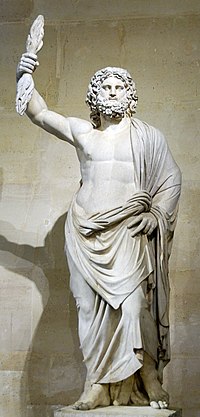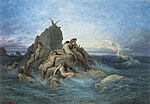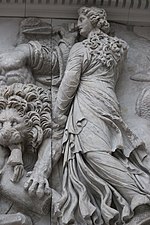 | The Theogony (Greek: Θεογονία, Theogonía, i.e. "the genealogy or birth of the gods") is a poem by Hesiod (8th–7th century BC) describing the origins and... 68 KB (5,729 words) - 04:02, 3 May 2024 |
 | Nyx (section An ancient theogony?) "Night") is the goddess and personification of the night. In Hesiod's Theogony, she is the offspring of Chaos, and the mother of Aether and Hemera (Day)... 100 KB (10,971 words) - 18:37, 22 April 2024 |
 | Orphism (religion) (redirect from Eudemian Theogony) re-interpretation or re-reading of the myth of Dionysus and a re-ordering of Hesiod's Theogony, based in part on pre-Socratic philosophy. The suffering and death of the... 35 KB (4,040 words) - 09:18, 28 April 2024 |
 | explicit references in Works and Days, as well as some passages in his Theogony, that support inferences made by scholars. The former poem says that his... 46 KB (5,954 words) - 05:25, 22 April 2024 |
 | ὁ Τῑτᾱ́ν, -ήν, ho Tītân) were the pre-Olympian gods. According to the Theogony of Hesiod, they were the twelve children of the primordial parents Uranus... 85 KB (9,258 words) - 11:39, 30 April 2024 |
 | Aether (mythology) (section Derveni Theogony) Chronos (Time), and the brother of Chaos and Erebus. According to Hesiod's Theogony, which contained the "standard" Greek genealogy of the gods, Aether was... 31 KB (3,284 words) - 22:00, 10 February 2024 |
instead personifications of places or abstract concepts. Hesiod, in his Theogony, considers the first beings (after Chaos) to be Erebus, Gaia, Tartarus... 22 KB (2,339 words) - 11:36, 26 March 2024 |
 | Hecatoncheires (section The Theogony) was probably formed from the Greek βριαρός meaning "strong". Hesiod's Theogony also calls him "Obriareus". The name Gyges is possibly related to the mythical... 82 KB (9,059 words) - 22:13, 10 February 2024 |
 | by whom the Iliad states that he fathered Aphrodite. According to the Theogony, Zeus' first wife was Metis, by whom he had Athena. Zeus was also infamous... 202 KB (17,283 words) - 16:22, 5 May 2024 |
 | Fabulae Theogony 1–2 (Smith and Trzaskoma, p. 95). Hard, p. 24; Gantz, p. 10; Hesiod Theogony 126–128. Hesiod, Theogony 132–153. Hesiod, Theogony 154–155... 41 KB (4,146 words) - 18:15, 3 May 2024 |
gloom"'), or Erebos, is the personification of darkness. In Hesiod's Theogony, he is the offspring of Chaos, and the father of Aether and Hemera (Day)... 23 KB (2,421 words) - 23:38, 27 April 2024 |
 | Gantz, pp. 99–100. Hesiod, Theogony 126–8 Hesiod, Theogony 131–2 Hesiod, Theogony 129–30 Hesiod, Theogony 233–9 Hesiod, Theogony 820–2 Euripides, Iphigenia... 66 KB (6,014 words) - 12:45, 2 May 2024 |
 | 151 by Hyginus, the Metamorphoses (book VI 339 by Ovid; IX 648), and the Theogony 319ff by Hesiod. Virgil, in the Aeneid (book 5) employs Chimaera for the... 21 KB (2,222 words) - 13:43, 4 May 2024 |
the twelve or thirteen Titans, the children of Gaia and Uranus. In the Theogony, Uranus imprisoned all the children that Gaia bore him, before he was overthrown... 26 KB (2,107 words) - 22:24, 10 February 2024 |
 | s.v. "Charis". Hesiod, Theogony 240–264; Apollodorus, 1.2.7. Hesiod, Theogony 286–288; Apollodorus, 2.5.10. Hesiod, Theogony 351, however according to... 59 KB (4,993 words) - 21:52, 30 April 2024 |
Greek mythological figures List of Greek mythological creatures Hesiod’s Theogony There are conflicting stories regarding the origins of Eros. Eros is usually... 9 KB (307 words) - 21:57, 9 March 2024 |
gaping space below the Earth on which Earth rests." Passages in Hesiod's Theogony suggest that Chaos was located below Earth but above Tartarus. Primal Chaos... 32 KB (3,553 words) - 06:06, 16 April 2024 |
 | creatures. Three groups of Cyclopes can be distinguished. In Hesiod's Theogony, the Cyclopes are the three brothers Brontes, Steropes, and Arges, who... 80 KB (8,977 words) - 08:20, 4 May 2024 |
 | Georgics 4.343 Hesiod, Theogony 349–361; Apollodorus, 1.2.2 Virgil, Georgics 4.341; Nonnus, Dionysiaca 41.153 Hesiod, Theogony 349–361; Homeric Hymn to... 27 KB (1,579 words) - 04:30, 7 March 2024 |
 | According to Hesiod, Theogony 507–511, Clymene, one of the Oceanids, the daughters of Oceanus and Tethys, at Hesiod, Theogony 351, was the mother by... 34 KB (3,202 words) - 01:42, 30 April 2024 |
 | Even Hera addressed her as "Lady Themis". Themis occurred in Hesiod's Theogony as the first recorded appearance of Justice as a divine personage. Drawing... 40 KB (3,481 words) - 22:31, 22 April 2024 |
 | and that other, because he held a golden blade in his hands. — Hesiod, Theogony In Greek mythology, Medusa was one of the Gorgons, three monstrous siblings... 5 KB (466 words) - 19:27, 21 March 2024 |
 | Apollodorus, 1.2.6. Hesiod, Theogony 956–957; Apollodorus, 1.9.1. Hesiod, Theogony 958–962; Apollodorus, 1.9.23. Hesiod, Theogony 286–288; Apollodorus, 2... 20 KB (2,040 words) - 11:56, 7 March 2024 |
 | 262–263. OCLC 13809803. Retrieved 2018-04-10. Hesiod, Theogony 929 Scholia on Hesiod's Theogony 886 Keightley, p. 153, note b. Apollodorus, 1.3.6. Gantz... 12 KB (1,298 words) - 16:29, 3 April 2024 |






